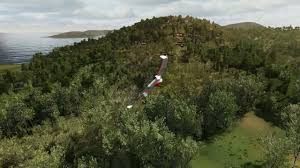Rwanda
See the following -
2015 Was a Good Year for Creating the World's 'Missing Maps' with OpenStreetMap
 The Missing Maps project, which launched in 2014, aims to literally and figuratively put more than 20-million at-risk people on the map using OpenStreetMap (OSM) as a platform. We need to fill in "missing maps" before the next disaster strikes, ensuring the maps have detail sufficient for emergency responders to hit the ground running. OpenStreetMap is an open and free source of geographic data. Anyone with a username can add, edit, or update data, so the Missing Maps project is community driven and focuses on local knowledge. Remote volunteers around the world use satellite imagery to trace features, such as roads and buildings. Community members and volunteers in the area then use the base map to add local data to these shapes, including street names, addresses, building types, and points of interest. As we look back at 2015, here are a few success stories from the Missing Maps project...
The Missing Maps project, which launched in 2014, aims to literally and figuratively put more than 20-million at-risk people on the map using OpenStreetMap (OSM) as a platform. We need to fill in "missing maps" before the next disaster strikes, ensuring the maps have detail sufficient for emergency responders to hit the ground running. OpenStreetMap is an open and free source of geographic data. Anyone with a username can add, edit, or update data, so the Missing Maps project is community driven and focuses on local knowledge. Remote volunteers around the world use satellite imagery to trace features, such as roads and buildings. Community members and volunteers in the area then use the base map to add local data to these shapes, including street names, addresses, building types, and points of interest. As we look back at 2015, here are a few success stories from the Missing Maps project...
- Login to post comments
Agricultural Policies in Africa Could Be Harming the Poorest
 Published this month in the journal World Development, the study finds that so-called ‘green revolution’ policies in Rwanda - claimed by the government, international donors and organisations such as the International Monetary Fund to be successful for the economy and in alleviating poverty - may be having very negative impacts on the poorest. One of the major strategies to reduce poverty in sub-Saharan Africa is through policies to increase and modernise agricultural production...
Published this month in the journal World Development, the study finds that so-called ‘green revolution’ policies in Rwanda - claimed by the government, international donors and organisations such as the International Monetary Fund to be successful for the economy and in alleviating poverty - may be having very negative impacts on the poorest. One of the major strategies to reduce poverty in sub-Saharan Africa is through policies to increase and modernise agricultural production...
- Login to post comments
AHRQ Providing Support for OpenMRS
As the AHRQ report explains it, “PIH and the Regenstrief Institute in Indianapolis conceived of OpenMRS in 2005 as a flexible, open source EMR that would be capable of meeting the demand for high-quality health information in developing countries such as Rwanda and Kenya, where the two organizations were then working. Read More »
- Login to post comments
Apelon and Jembi Health Systems Bring Sustainable Information Systems To Rwanda
Apelon Medical Terminology in Practice recently published the press release “Apelon Selected to Support HIE Initiative in Rwanda as Part of Effort to Improve Antenatal/ Prenantal Care.” Read More »
- Login to post comments
Applying New And Existing Technologies To Atrocity Prevention
Over the past year, I’ve had the honor to be part of the team at USAID implementing the President’s vision of preventing and responding to mass atrocities, including through my service on the White House’s Atrocity Prevention Board. I have deep personal connections to the issue of atrocity prevention, having worked throughout my career on countries in the midst of conflict where such atrocities have occurred, from Rwanda to Angola to Libya. Read More »
- Login to post comments
Building an Open Medical Records System for the Developing World
 How do you introduce a woman whose very life is the epitome of humanitarian efficacy? Judy Gichoya is a Kenyan medical doctor specializing in radiology and an experienced programmer who's accelerating the growth of OpenMRS. According to its website, "OpenMRS is a software platform and a reference application which enables design of a customized medical records system with no programming knowledge." Judy first got interested in computers in high school, prior to entering medical school she learned to program at a technical college and through online resources on the internet...
How do you introduce a woman whose very life is the epitome of humanitarian efficacy? Judy Gichoya is a Kenyan medical doctor specializing in radiology and an experienced programmer who's accelerating the growth of OpenMRS. According to its website, "OpenMRS is a software platform and a reference application which enables design of a customized medical records system with no programming knowledge." Judy first got interested in computers in high school, prior to entering medical school she learned to program at a technical college and through online resources on the internet...
- Login to post comments
Condom Airborne Meds: 6 Ways Drones Could Change Health Care
 Drones have been used to deliver sunscreen to a conference in Palm Springs, Calif., and pizza to a family in New Zealand, but they’re also in the air for far more urgent purposes — such as saving lives. In fact, in some cases, drones could carry defibrillators to heart attack victims faster than an ambulance, according to a paper published Tuesday in the Journal of the American Medical Association. Researchers simulated emergency situations and found they could get automatic external defibrillators to the scene an average of 16 minutes faster by drone than by ambulance...
Drones have been used to deliver sunscreen to a conference in Palm Springs, Calif., and pizza to a family in New Zealand, but they’re also in the air for far more urgent purposes — such as saving lives. In fact, in some cases, drones could carry defibrillators to heart attack victims faster than an ambulance, according to a paper published Tuesday in the Journal of the American Medical Association. Researchers simulated emergency situations and found they could get automatic external defibrillators to the scene an average of 16 minutes faster by drone than by ambulance...
- Login to post comments
Developing Nations Improving Health Communication Through the Use of DHIS2 (Part 1)
 DHIS2 implementations are spreading steadily among national health services in developing countries as well as among international non-governmental organizations (NGOs) working to improving health in the developing world through the use of health information technology. As an open source solution, DHIS2 offers developing countries the advantage of adopting a cost-effective and flexible solution for aggregate statistical data collection, validation, analysis, management, and presentation as well as for data sharing between healthcare professionals and facilities. Organizations and individuals who work with humanitarian software solutions will need to know what DHIS2 is, how it works, and how it might be implemented by national health services and other health-related projects across the globe...
DHIS2 implementations are spreading steadily among national health services in developing countries as well as among international non-governmental organizations (NGOs) working to improving health in the developing world through the use of health information technology. As an open source solution, DHIS2 offers developing countries the advantage of adopting a cost-effective and flexible solution for aggregate statistical data collection, validation, analysis, management, and presentation as well as for data sharing between healthcare professionals and facilities. Organizations and individuals who work with humanitarian software solutions will need to know what DHIS2 is, how it works, and how it might be implemented by national health services and other health-related projects across the globe...
- Login to post comments
DHIS2 - Transforming Health IT Standards in the Developing World (Part 2)
 Rwanda's 2012 implementation of DHIS2 is one of at least 16 completed national rollouts of this free and open source health data management. A total of 54 countries are deploying DHIS2 on a national scale, 30 of which are in the pilot stage or early phase in their rollouts. Since DHIS2's release in 2006, NGOs and national governments in 60 countries have deployed DHIS2 for health-related projects, including patient health monitoring, improving disease surveillance and pinpointing outbreaks, and speeding up health data access.
Rwanda's 2012 implementation of DHIS2 is one of at least 16 completed national rollouts of this free and open source health data management. A total of 54 countries are deploying DHIS2 on a national scale, 30 of which are in the pilot stage or early phase in their rollouts. Since DHIS2's release in 2006, NGOs and national governments in 60 countries have deployed DHIS2 for health-related projects, including patient health monitoring, improving disease surveillance and pinpointing outbreaks, and speeding up health data access.
- Login to post comments
In Rwanda, Health Care Coverage That Eludes the U.S.
Last week’s Supreme Court decision upholding of the constitutionality of President Obama’s health care law moves the United States closer to the goal of health coverage for all. All other developed countries have it. But so do some developing nations... Read More »
- Login to post comments
Medical Drones Could Beat Amazon to the Skies, with Harvard Help
 The less you’ve got, the less you’ve got to lose. Which is why cargo delivery drones may become popular in Africa long before they catch on over here. Jonathan Ledgard thinks it’ll happen. The former chief Africa correspondent of the news magazine The Economist is coming to Boston on Thursday to lay out his plan to build a cargo network called Redline. Developed with help from students at Harvard University’s Kennedy School of Government, and backed by the government of Switzerland, Redline will use drones to deliver medical supplies to remote parts of Rwanda. It has already raised $8 million...
The less you’ve got, the less you’ve got to lose. Which is why cargo delivery drones may become popular in Africa long before they catch on over here. Jonathan Ledgard thinks it’ll happen. The former chief Africa correspondent of the news magazine The Economist is coming to Boston on Thursday to lay out his plan to build a cargo network called Redline. Developed with help from students at Harvard University’s Kennedy School of Government, and backed by the government of Switzerland, Redline will use drones to deliver medical supplies to remote parts of Rwanda. It has already raised $8 million...
- Login to post comments
mHealth Alliance Honors Mobile Health Visionaries in First-Ever Awards Ceremony at mHealth Summit
The mHealth Alliance, an organization dedicated to advancing the use of mobile technologies to improve health outcomes in low- and middle-income countries, announced this evening the winners of the Holly Ladd mHealth Pioneer Award and the mHealth Alliance Collaboration Award. This marks the first time that the Alliance has extended these honors. Dr. Richard Gakuba of Rwanda received the Holly Ladd mHealth Pioneer Award, while the Ananya partnership of Bihar, India, received the mHealth Alliance Collaboration Award...
- Login to post comments
Nineteen Countries Save $149 Million With Open Source Health Workforce Information Systems
Nineteen countries are now using iHRIS, a free and open source human resources information system, to support over 810,000 health worker records. It would cost more than $149 million in licensing fees alone for these countries to support a similar number of records with a proprietary system purchased from for-profit companies.
- Login to post comments
Open Health Internet Tool Helps Track Medics in Africa
Resource allocation towards reproductive, maternal, newborn and child health (RMNCH) in Uganda is expected to improve after the country unveiled an online tracking tool. The new move is part of the East African Community support to member states, under the Open Health Initiative, in building sustainable networks that will improve women and children's health. Read More »
- Login to post comments
Open Source Space Academy Opens in Nairobi
 Nairobi's Tunapanda Institute has been using open source tools to provide technology, design, and business training in East Africa since its inception in 2013. Next year the school will launch a "space academy" to inspire young people to think about some of the most critical challenges facing humanity on this planet and beyond. Tunapanda's founders believe that everyone should have the opportunity to help shape the future, and in order for that to happen there must be learning materials and tools that are open, shareable, and unrestricted so that anyone, no matter their financial or educational background, can learn and be inspired.
Nairobi's Tunapanda Institute has been using open source tools to provide technology, design, and business training in East Africa since its inception in 2013. Next year the school will launch a "space academy" to inspire young people to think about some of the most critical challenges facing humanity on this planet and beyond. Tunapanda's founders believe that everyone should have the opportunity to help shape the future, and in order for that to happen there must be learning materials and tools that are open, shareable, and unrestricted so that anyone, no matter their financial or educational background, can learn and be inspired.
- Login to post comments